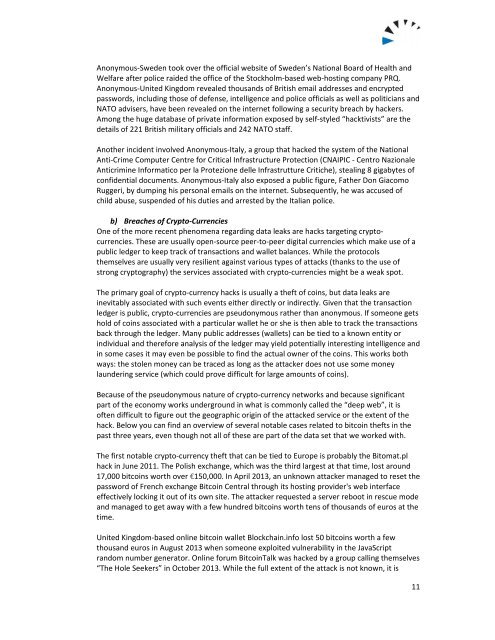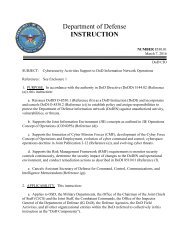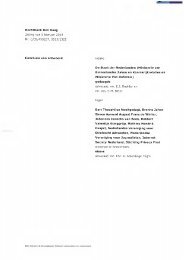data-breaches-in-europe
data-breaches-in-europe
data-breaches-in-europe
Create successful ePaper yourself
Turn your PDF publications into a flip-book with our unique Google optimized e-Paper software.
Anonymous‐Sweden took over the official website of Sweden’s National Board of Health and<br />
Welfare after police raided the office of the Stockholm‐based web‐host<strong>in</strong>g company PRQ.<br />
Anonymous‐United K<strong>in</strong>gdom revealed thousands of British email addresses and encrypted<br />
passwords, <strong>in</strong>clud<strong>in</strong>g those of defense, <strong>in</strong>telligence and police officials as well as politicians and<br />
NATO advisers, have been revealed on the <strong>in</strong>ternet follow<strong>in</strong>g a security breach by hackers.<br />
Among the huge <strong>data</strong>base of private <strong>in</strong>formation exposed by self‐styled “hacktivists” are the<br />
details of 221 British military officials and 242 NATO staff.<br />
Another <strong>in</strong>cident <strong>in</strong>volved Anonymous‐Italy, a group that hacked the system of the National<br />
Anti‐Crime Computer Centre for Critical Infrastructure Protection (CNAIPIC ‐ Centro Nazionale<br />
Anticrim<strong>in</strong>e Informatico per la Protezione delle Infrastrutture Critiche), steal<strong>in</strong>g 8 gigabytes of<br />
confidential documents. Anonymous‐Italy also exposed a public figure, Father Don Giacomo<br />
Ruggeri, by dump<strong>in</strong>g his personal emails on the <strong>in</strong>ternet. Subsequently, he was accused of<br />
child abuse, suspended of his duties and arrested by the Italian police.<br />
b) Breaches of Crypto‐Currencies<br />
One of the more recent phenomena regard<strong>in</strong>g <strong>data</strong> leaks are hacks target<strong>in</strong>g cryptocurrencies.<br />
These are usually open‐source peer‐to‐peer digital currencies which make use of a<br />
public ledger to keep track of transactions and wallet balances. While the protocols<br />
themselves are usually very resilient aga<strong>in</strong>st various types of attacks (thanks to the use of<br />
strong cryptography) the services associated with crypto‐currencies might be a weak spot.<br />
The primary goal of crypto‐currency hacks is usually a theft of co<strong>in</strong>s, but <strong>data</strong> leaks are<br />
<strong>in</strong>evitably associated with such events either directly or <strong>in</strong>directly. Given that the transaction<br />
ledger is public, crypto‐currencies are pseudonymous rather than anonymous. If someone gets<br />
hold of co<strong>in</strong>s associated with a particular wallet he or she is then able to track the transactions<br />
back through the ledger. Many public addresses (wallets) can be tied to a known entity or<br />
<strong>in</strong>dividual and therefore analysis of the ledger may yield potentially <strong>in</strong>terest<strong>in</strong>g <strong>in</strong>telligence and<br />
<strong>in</strong> some cases it may even be possible to f<strong>in</strong>d the actual owner of the co<strong>in</strong>s. This works both<br />
ways: the stolen money can be traced as long as the attacker does not use some money<br />
launder<strong>in</strong>g service (which could prove difficult for large amounts of co<strong>in</strong>s).<br />
Because of the pseudonymous nature of crypto‐currency networks and because significant<br />
part of the economy works underground <strong>in</strong> what is commonly called the “deep web”, it is<br />
often difficult to figure out the geographic orig<strong>in</strong> of the attacked service or the extent of the<br />
hack. Below you can f<strong>in</strong>d an overview of several notable cases related to bitco<strong>in</strong> thefts <strong>in</strong> the<br />
past three years, even though not all of these are part of the <strong>data</strong> set that we worked with.<br />
The first notable crypto‐currency theft that can be tied to Europe is probably the Bitomat.pl<br />
hack <strong>in</strong> June 2011. The Polish exchange, which was the third largest at that time, lost around<br />
17,000 bitco<strong>in</strong>s worth over €150,000. In April 2013, an unknown attacker managed to reset the<br />
password of French exchange Bitco<strong>in</strong> Central through its host<strong>in</strong>g provider's web <strong>in</strong>terface<br />
effectively lock<strong>in</strong>g it out of its own site. The attacker requested a server reboot <strong>in</strong> rescue mode<br />
and managed to get away with a few hundred bitco<strong>in</strong>s worth tens of thousands of euros at the<br />
time.<br />
United K<strong>in</strong>gdom‐based onl<strong>in</strong>e bitco<strong>in</strong> wallet Blockcha<strong>in</strong>.<strong>in</strong>fo lost 50 bitco<strong>in</strong>s worth a few<br />
thousand euros <strong>in</strong> August 2013 when someone exploited vulnerability <strong>in</strong> the JavaScript<br />
random number generator. Onl<strong>in</strong>e forum Bitco<strong>in</strong>Talk was hacked by a group call<strong>in</strong>g themselves<br />
“The Hole Seekers” <strong>in</strong> October 2013. While the full extent of the attack is not known, it is<br />
11
















